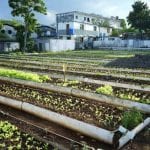Contents
Waterfront Park in Venice
A 1,400-acre urban park is taking shape on the site of a landfill on the lagoon facing Venice, Italy. Parco San Guiliano will contain 13 activity centers featuring boating clubs, marinas, museums, an aquarium, a marine biology research institute, botanical gardens, an ecological preserve, exhibition areas, and sculpture gardens. These attractions will be linked by pedestrian and bike paths as well as canals. The design seeks to minimize roads and traffic. A children’s museum will offer interactive displays, while a nautical museum will call attention to the region’s seafaring history and new boat-building facilities.
Much of the focus of the 10-year-long project will be on ecological restoration. Plans call for restoring historic salt marshes, bringing back native plants, and cleaning up accumulated toxic industrial wastes. (Waterfront World Spotlight)
Better Transit in Lisbon
Lisbon, Portugal is renovating and expanding its Metro system, which by the year 2000 will be 37 kilometers long with 47 stations. Headways on the city’s Yellow and Blue lines have been reduced to just over two minutes during peak hours and five minutes off-peak.. The city’s three commuter rail lines are providing an additional 500,000 trips per day, with the Sintra Line among the busiest in Europe.
A stunning number of Portuguese are also riding buses, with the city’s 815 vehicles providing more than one million trips a day. Among the reasons may be that there is very little parking downtown and that almost all forms of parking require payment. Many of Lisbon’s buses arrive at five or six minute intervals, providing frequent and convenient service. The city’s transit improvements are being funded in part by national automobile registration fees, auto sales taxes, and gasoline taxes. (Roy Nakedegawa/Matt Williams)
Germany Moves to Limit Truck Traffic
In response to citizen calls for “truck free” communities, the German government has taken the lead among European nations in efforts to limit truck traffic. One initiative will set up 30 urban freight consolidation and transfer points nationwide, known as “GVZs,” where trucks can shift freight to trains or barges. The system aims to reduce duplication of truck routes, consolidate deliveries into fewer vehicles, and draw truck depots out of central cities.
Pressure from the nation’s Green party has also led the trucking industry to establish “Euro I, Euro II, and Euro III” ratings for trucks, representing progressively quieter and cleaner vehicles. Austria now prohibits vehicles below Euro II from using roads in certain parts of the country at nighttime, when citizens perceive truck noise to be the greatest problem. Higher taxes on the heavily polluting Euro I trucks are also a possibility down the line. (American Shipper)
Colombia’s “Recycling People”
For the past decade the Bogata, Colombia-based Fundacion Social has been working with the 50,000 urban families who make their living scavenging garbage to improve recycling processes and supply the workers with needed social programs.
Called “recicladores” (recycling people), these waste-pickers recycle vast quantities of goods from the city’s dumps. Part of the agency’s “sustainability initiative” has been to improve ways of transporting these recycled goods to market and ensuring their quality. Recent improvements in organization and technologies have brought about a 30 percent increase in average wages, and a new social benefits system provides access to hospitalization, health care, children’s education, women’s needs, and a pension fund. The garbage pickers’ association has recently constructed a new waste processing plant in the city of Manizales, and has signed contracts with 15 Colombian cities for waste disposal. (United Nations Centre for Human Settlements)
UNDP Optimistic About Poverty
In a surprisingly upbeat 1997 edition of its Human Development Report, the United Nations Development Program (UNDP) finds that many indicators of human welfare are improving around the world. The agency notes that poverty rates have fallen in more than 100 developing countries. Since 1960 child death rates in developing countries have been halved, while malnutrition rates have declined by almost one-third. The proportion of children in primary school has risen from less than half to more than three-quarters. And the share of rural families with access to safe water has risen from a tenth to about three-quarters.
To be sure, UNDP researchers point out that the degree of advance differs widely between regions, that 800 million people still do not get enough to eat, and that women and children are particularly affected by poverty. However, the agency estimates the additional cost of achieving basic social services for all in developing countries at only $40 billion a year — less than 0.2 percent of global income. The UNDP advocates steps to produce gender equality and “pro-poor growth,” as well as debt reduction for the poorest countries and fair trade rules to allow poor countries to enter markets.
This year Canada once again tops the agency’s “Human Development Index,” followed by France and Norway. The U.S. has slipped to fourth, largely because its poverty rates have risen from 16 percent in 1974 to more than 19 percent in 1994, a figure that includes one out of four children. For more information, contact UNDP at (212) 906-5312.
Shorts
In Australia, 40 Melbourne activists staged a “cough-in,” collapsing in the middle of a downtown intersection to protest plans for new parking garages and suburban sprawl. (Earth Island Journal)
The “Green” Hotels Association is celebrating its 100th member worldwide. Members adopt water and energy conservation strategies, recycle leftover food, and commit to policies of environmental responsibility. For more information, contact the association at (713) 789-8889.
Among the recipients of the Swedish Parliament’s 1997 Right Livelihood Awards — the alternative Nobel Prize — are Kerala Sastra Sahithya Parishat, a group helping bring about people-centered development in the Indian state of Kerala, and economist Herman Daly, known for his work “in formulating an economic approach that integrates the key elements of ethics, quality of life, environment and community, in contrast to the mainstream obsession with quantitative economic growth and free trade.” (Co-op America Quarterly)







